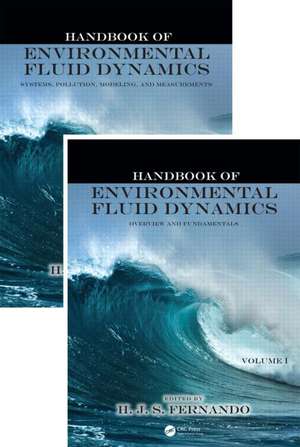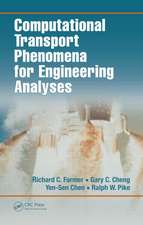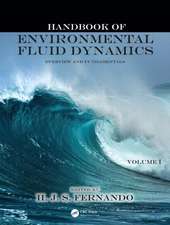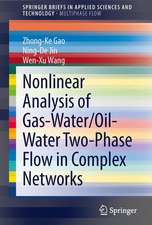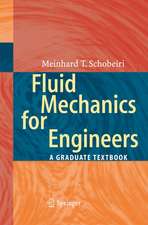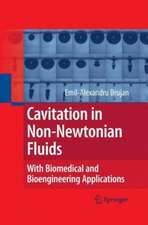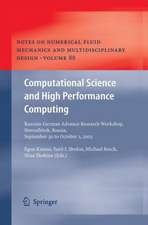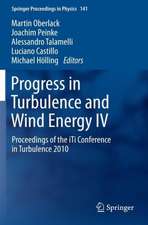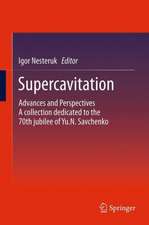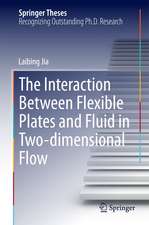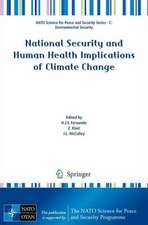Handbook of Environmental Fluid Dynamics, Two-Volume Set
Editat de Harindra Joseph Fernandoen Limba Engleză Hardback – 11 dec 2012
The handbook features 81 chapters written by 135 renowned researchers from around the world. Covering environmental, policy, biological, and chemical aspects, it tackles important cross-disciplinary topics such as sustainability, ecology, pollution, micrometeorology, and limnology.
Volume One: Overview and Fundamentals provides a comprehensive overview of the fundamentals, including introductory topics, general principles, and fundamental flow types. It emphasizes the close relevance of environmental fluid dynamics research in society, public policy, infrastructure, quality of life, security, and the law. The book explores established and emerging areas related to environmental fluid dynamics. It also describes sub-mesoscale flow processes and phenomena that form the building blocks of environmental motions.
Volume Two: Systems, Pollution, Modeling, and Measurements explores the interactions between engineered structures and natural flows. It also discusses the major topic of environmental pollution, with a focus on numerical methods, predictive modeling, and computer infrastructure developments. The book also looks at practical aspects of laboratory experiments and field observations that validate quantitative predictions and help identify new phenomena and processes.
As communities face existential challenges posed by climate change, rapid urbanization, and scarcity of water and energy, the study of environmental fluid dynamics becomes increasingly relevant. This wide-ranging handbook is a valuable resource for students, researchers, and policymakers working to better understand natural motions and how they affect and are influenced by anthropogenic activities.
| Toate formatele și edițiile | Preț | Express |
|---|---|---|
| Paperback (1) | 595.71 lei 6-8 săpt. | |
| CRC Press – 14 aug 2020 | 595.71 lei 6-8 săpt. | |
| Hardback (1) | 1288.79 lei 6-8 săpt. | |
| CRC Press – 11 dec 2012 | 1288.79 lei 6-8 săpt. |
Preț: 1288.79 lei
Preț vechi: 1698.12 lei
-24% Nou
Puncte Express: 1933
Preț estimativ în valută:
246.60€ • 258.17$ • 204.05£
246.60€ • 258.17$ • 204.05£
Carte tipărită la comandă
Livrare economică 05-19 aprilie
Preluare comenzi: 021 569.72.76
Specificații
ISBN-13: 9781466556034
ISBN-10: 146655603X
Pagini: 1222
Ilustrații: 723 b/w images and 35 tables
Dimensiuni: 219 x 276 x 74 mm
Greutate: 3.31 kg
Ediția:New.
Editura: CRC Press
Colecția CRC Press
ISBN-10: 146655603X
Pagini: 1222
Ilustrații: 723 b/w images and 35 tables
Dimensiuni: 219 x 276 x 74 mm
Greutate: 3.31 kg
Ediția:New.
Editura: CRC Press
Colecția CRC Press
Public țintă
Researchers, graduate students, policy makers, and other professionals working in environmental engineering, energy, environmental sciences, physics, oceanography, meteorology, and related areas.Cuprins
Volume One: Overview and General Topics. Focus Areas for Study of Natural Systems. Fundamental Flow Phenomena and Turbulence. Volume Two: Engineered Systems and Anthropogenic Influence. Environmental Pollution. Numerical Modeling of Environmental Flows. Laboratory Modeling of Environmental Flows. Environmental Measurements.
Notă biografică
Harindra Joseph Shermal Fernando is the Wayne and Diana Murdy Endowed Professor of Engineering and Geosciences at the University of Notre Dame, with the primary affiliation in the Department of Civil and Environmental Engineering and Earth Sciences and a concurrent appointment in the Department of Aerospace and Mechanical Engineering. He has received numerous awards and honors, including a UNESCO Team Gold Medal (1979), Presidential Young Investigator Award (NSF, 1986), and Rieger Foundation Distinguished Scholar Award in Environmental Sciences (2001). He is a fellow of the American Society of Mechanical Engineers, American Physical Society, and American Meteorological Society and was elected to the European Academy in 2009. He serves on the editorial boards of Applied Mechanics Reviews (associate editor), Theoretical and Computational Fluid Dynamics (editor, 1997–), IAHR Journal of Hydro-Environment (associate editor), Physics of Fluids (associate editor) and EGS Journal of Non-Linear Processes in Geophysics (editor). He is also the editor in chief of the Journal of Environmental Fluid Dynamics. Professor Fernando has published more than 225 papers spanning nearly 50 international peer-reviewed journals.
Recenzii
"I strongly recommend the two-volume Handbook of Environmental Fluid Dynamics to all scientists and engineers involved in or just intrigued by the interplay of fluid dynamics with the environment. Guided by the skillful editorship of Joe Fernando, and dedicated to the memory of Owen M. Phillips, a marvelous teacher and one of the top geophysical fluid dynamicists of the past century, every topic of importance in environmental fluid dynamics is superbly addressed by an outstanding selection of authors; I predict the books will be an important resource for years to come."
—Professor James J. Riley, University of Washington
"This handbook is probably the most prestigious and broadest survey in environmental fluid dynamics that has come to light so far. It brings together state-of-the-art knowledge of leading experts in topics ranging from climate change and risk assessment to more fundamental subjects such as turbulence and dispersion within two volumes and 81 chapters. It promises to become one of the most important references in this field."
—Professor Jan-Bert Flór, Laboratoire des Ecoulements Géophysiques et Industriels, CNRS
"Dr. Fernando has assembled an impressive team of contributors from a wide range of fields. The book is as close to a comprehensive view of the field as possible in one handbook."
—Professor John S. Gulliver, University of Minnesota
"This grand two-volume set provides an excellent exposé of the vast interdisciplinary field of environmental fluid dynamics including its societal importance. The work spans time and space scales ranging from small-scale stratified turbulence to large-scale climate and introduces the reader to the many observational, theoretical, and numerical techniques used to study outdoor flows—a great resource."
—Dr. Peter Sullivan, National Center for Atmospheric Research
"I will definitely recommend this handbook to students and stakeholders concerned by en
—Professor James J. Riley, University of Washington
"This handbook is probably the most prestigious and broadest survey in environmental fluid dynamics that has come to light so far. It brings together state-of-the-art knowledge of leading experts in topics ranging from climate change and risk assessment to more fundamental subjects such as turbulence and dispersion within two volumes and 81 chapters. It promises to become one of the most important references in this field."
—Professor Jan-Bert Flór, Laboratoire des Ecoulements Géophysiques et Industriels, CNRS
"Dr. Fernando has assembled an impressive team of contributors from a wide range of fields. The book is as close to a comprehensive view of the field as possible in one handbook."
—Professor John S. Gulliver, University of Minnesota
"This grand two-volume set provides an excellent exposé of the vast interdisciplinary field of environmental fluid dynamics including its societal importance. The work spans time and space scales ranging from small-scale stratified turbulence to large-scale climate and introduces the reader to the many observational, theoretical, and numerical techniques used to study outdoor flows—a great resource."
—Dr. Peter Sullivan, National Center for Atmospheric Research
"I will definitely recommend this handbook to students and stakeholders concerned by en
Descriere
With major implications for applied physics, engineering, and the natural and social sciences, the rapidly growing area of environmental fluid dynamics focuses on the interactions of human activities, environment, and fluid motion. A landmark for the field, this two-volume handbook presents the basic principles, fundamental flow processes, modeling techniques, and measurement methods used in the field, along with critical discussions of environmental sustainability related to engineering aspects. The first volume provides a comprehensive overview of the fundamentals, and the second volume explores the interactions between engineered structures and natural flows.
